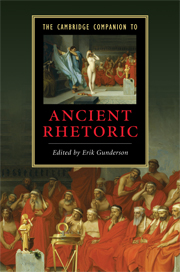Book contents
- Frontmatter
- Introduction
- Part 1 An archaeology of rhetoric
- Part II The field of language
- Part III The practice of rhetoric
- 8 Types of oratory
- 9 Rhetoric of the Athenian citizen
- 10 Rhetoric and the Roman Republic
- 11 Staging rhetoric in Athens
- 12 The drama of rhetoric at Rome
- 13 Rhetoric and the Second Sophistic
- Part IV Epilogoues
- Appendix 1: Rhetorical terms
- Appendix 2: Authors and prominent individuals
- References
- Index of passages
- Index of subjects
- Series list
11 - Staging rhetoric in Athens
from Part III - The practice of rhetoric
Published online by Cambridge University Press: 28 January 2010
- Frontmatter
- Introduction
- Part 1 An archaeology of rhetoric
- Part II The field of language
- Part III The practice of rhetoric
- 8 Types of oratory
- 9 Rhetoric of the Athenian citizen
- 10 Rhetoric and the Roman Republic
- 11 Staging rhetoric in Athens
- 12 The drama of rhetoric at Rome
- 13 Rhetoric and the Second Sophistic
- Part IV Epilogoues
- Appendix 1: Rhetorical terms
- Appendix 2: Authors and prominent individuals
- References
- Index of passages
- Index of subjects
- Series list
Summary
Why tragic and comic poets, with their divergent approaches to drama, converge in their ambivalence to democratic oratory, is a fascinating question, since on the face of it, dramatists and orators have much in common. Like orators, dramatists were citizens of Athens authorized by the democracy and occupied a prestigious place within the city’s speech regime. Dramatists, like orators, competed for victory before mass audiences, though five judges randomly selected from a pool of ten determined victory in dramatic contests, not a majority of spectators. Their audiences, though not identical, overlapped; Demosthenes calls jurors as witnesses to events that transpired in the theater (21.18, 226). As Simon Goldhill writes, “to be in an audience is not just a thread in the city’s social fabric, it is a fundamental political act.” Most scholars believe that performances of tragedies and comedies at festivals in honor of Dionysus, god of wine and life-giving liquids, were in some sense political. How political were they? This essay discusses the anatomy of fifth-century theater’s negative engagements with democratic oratory and orators and suggests that its symbolic violence towards democratic speech regimes aroused a potentially anti-democratic nostalgia for a fictionalized time of unitary socioeconomic, political, and moral orders, the time of the fathers expressed in the slogans “ancestral constitution” and “ancestral laws.”
- Type
- Chapter
- Information
- The Cambridge Companion to Ancient Rhetoric , pp. 194 - 211Publisher: Cambridge University PressPrint publication year: 2009



